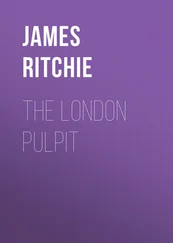James Ritchie - The Religious Life of London
Здесь есть возможность читать онлайн «James Ritchie - The Religious Life of London» — ознакомительный отрывок электронной книги совершенно бесплатно, а после прочтения отрывка купить полную версию. В некоторых случаях можно слушать аудио, скачать через торрент в формате fb2 и присутствует краткое содержание. Жанр: foreign_prose, на английском языке. Описание произведения, (предисловие) а так же отзывы посетителей доступны на портале библиотеки ЛибКат.
- Название:The Religious Life of London
- Автор:
- Жанр:
- Год:неизвестен
- ISBN:нет данных
- Рейтинг книги:3 / 5. Голосов: 1
-
Избранное:Добавить в избранное
- Отзывы:
-
Ваша оценка:
- 60
- 1
- 2
- 3
- 4
- 5
The Religious Life of London: краткое содержание, описание и аннотация
Предлагаем к чтению аннотацию, описание, краткое содержание или предисловие (зависит от того, что написал сам автор книги «The Religious Life of London»). Если вы не нашли необходимую информацию о книге — напишите в комментариях, мы постараемся отыскать её.
The Religious Life of London — читать онлайн ознакомительный отрывок
Ниже представлен текст книги, разбитый по страницам. Система сохранения места последней прочитанной страницы, позволяет с удобством читать онлайн бесплатно книгу «The Religious Life of London», без необходимости каждый раз заново искать на чём Вы остановились. Поставьте закладку, и сможете в любой момент перейти на страницу, на которой закончили чтение.
Интервал:
Закладка:
In calculating the amount of Roman Catholic influence and activity, we must remember that in their churches and chapels service is always being performed; and that thus one Romanist place of worship for all practical purposes may often be considered as equivalent to a dozen Protestant places, especially where the incumbents are of the class of old-fashioned clergymen who have a relish for port and what used to be considered a gentlemanly religion. For instance, let us see what is the round of services at the cathedral, Blomfield Street, Moorfields. On Sundays and holidays there is mass at seven, eight, nine, ten, and high mass at eleven. At three there is catechism, at four baptism, and on Wednesdays and Fridays at eleven a. m.; vespers, sermon, and benediction at seven. On week-days mass is performed at half-past seven, eight, and ten. On Thursday, rosary, sermon, and benediction at eight; on the other evenings of the week rosary and night prayers at that hour. On the first Friday of the month there is sermon and benediction in honour of the Sacred Heart; on the second Friday of the month the Way of the Cross. There are the confessions, sometimes twice a day; and the Confraternities of the Blessed Sacrament, of the Sacred Heart, of Holy Angels for Children. Then there are the Societies, such as the Holy Family Total Abstinence Society, Holy Family Provident Society, Benevolent Society for the Relief of the Aged and Infirm Poor, and the Night Refuge for Homeless Women of Good Character. Nor is this the only way in which Roman Catholic influence is felt in this district. On good works the Roman Church has ever laid great stress, and thus we find from the centre in Blomfield Street the priests have specially assigned to them Newgate Prison, Old Bailey; Debtors’ Prison, Lower Whitecross Street; St. Bartholomew’s Hospital, Metropolitan Free Hospital, Royal London Ophthalmic Hospital, – an amount of exertion incompatible with spiritual ease and worldly enjoyment. I mention this to show that you are not to judge by what you see; attendance at any particular time is no criterion as to the state of the Catholic community. You may depend upon it that it is always much stronger than it seems. Those present are but a tithe of the Romanists in any particular locality, and the admirable organization of their priests peculiarly fits them for aggressive purposes. I believe they are most successful in the low neighbourhoods, in the guilt gardens, in which a great metropolis like ours abounds. Their charities in London are very extensive. There is a Catholic Poor School Committee, a Westminster Diocesan Education Fund, an Aged Poor Society, an Association for the Propagation of the Faith, a Society of St. Anselm, for the Diffusion of Good Books. The Associated Catholic Charities, for educating and apprenticing the children of poor Catholics, have six schools in London. The Immaculate Conception Charity assists the clergy in providing for children whose faith or morals are exposed to imminent danger through the death or helplessness of their parents. The Society of St. Vincent de Paul, whose chief object is visiting poor families at their own homes, has sixteen branches in London, besides a large Orphanage, at this time containing eighty boys, and a Catholic Shoeblack Brigade. The Sisters of Charity of St. Vincent de Paul have an establishment in Westminster. The oldest Roman Catholic charitable institution is the Benevolent Society for the Relief of the Aged and Infirm Poor, founded in the year 1761. During the six winters the Providence Row Night Refuge for Homeless Women and Children has been in existence, 92,194 nights’ lodgings, with suppers and breakfasts, have been given gratuitously. The only condition requisite for admission is that the applicant be homeless and without food and money. Such are the charities in London of the Roman Church.
As regards the pulpit, the Romanists are not wise in their generation. In London, where oratory can do so much, they fail to provide themselves with a grand and effective preacher. They have no Father Hyacinthe in London. Surely Italy might have sent us a Roman Catholic Gavazzi. Ireland supplies us with orators in abundance, but where are her eloquent priests? Cardinal Wiseman was florid and heavy. Archbishop Manning is more than sixty years old; and oratory, unlike wine, does not improve with age. His position, his talents, his zeal, incline you to hear him with respect, nothing more. As I have listened in some of the fine old cathedrals of the Continent to fiery priests, thundering away to crowded and attentive audiences, it has often occurred to me that it is just as well we have no such preachers in London to bring the Roman Catholic Church into fashion; to make it the sensation of the hour; to do for it what Irving did for Presbyterianism when he drew around him to the Scotch Church in Hatton Garden all the beauty, the fashion, the genius, the intellect of his day.
The ordinary public service of a Roman Catholic Church requires little description; nor do you see it here as you do, for instance, in the magnificent cathedral of Antwerp, where, in the dim dusk of an autumn eve, while a flood of music floats down from the choir, and the gorgeous priests, with tapers and incense and costly banners, are sweeping, dimly seen, along the fretted aisles, the writer has often felt there is a strange, weird effect produced, which, here you can never dream of. All is poor, something like a theatre by daylight, or a fancy ball when the delusions of gas have been dispelled by the too candid and impartial rays of the sun. There are the tapers and the usual processions, the vestments of various colours, and the music ever flowing, while at the altar end the priests are bowing and kneeling and scattering incense, and performing the service of the mass. If you have to listen to a sermon, it will not be a long one; and if you be a Protestant, it will strike you as verbose in style and un-English in tone. Nearest to the altar will be the upper ten thousand, who come in broughams, and have fashionable aspirations. At the other end will be the very poor, such poor as you see nowhere else, scarcely educated enough to count, as they do on their knees, their beads, and certainly not competent to intelligent appreciation of the service. Of course the people kneel to the altar and cross themselves as they come in, and join in the worship with an appearance of piety (I mean the elder ones – young ladies who have eyes will use them, whether they be saints or sinners), which is pretty well for such an undemonstrative people as ourselves, but is nothing to that of the Moslem, who plumps on his knees, regardless of all, exclaiming Allah hû akbar ! as the Muezzin calls to prayer.
On the Continent it fares ill with the Papacy. In France – in Italy – in Austria – even in Spain it has lost its power. Its chief strength at this time seems to consist in the sayings and doings of an increasing section of the Church of England. It appears there is a society actually in existence to form a union with Rome, and Mr. Malet, the Vicar of Ardley, in Hertfordshire, was lately sent on such a mission. As to the idea of Christian union no one can find fault with that. It is lamentable that the Christian Church should be divided into sections that turn against each other the energies that should be devoted to the destruction of a common foe. That all should be brethren in Christ who believe in Him and lead a Christian life, is manifest, the common reader will say, in his desire after Christian unity. Mr. Malet comes then, of course, to all Christians, of whatever sect or denomination, and holds out to them the hand of fellowship? Alas! no; he does nothing of the kind. First of all he tells us he will not call himself a Protestant, then he dresses himself like a monk, and has his friends to call him “Brother Michael.” He then gets letters from the Archbishop of Canterbury and Dr. Manning, and goes to Rome humbly to ask the Pope to recognise the Church of England. Of course, at Rome, he is favourably received, and is delighted with all he saw, and seems to have swallowed all he heard, not even excepting the most monstrous fable or the absurdest legend. From Rome Brother Michael finds his way to Jerusalem – that Jerusalem that crucified the Lord of life, that stoned the prophets, that persecuted and slew the teachers and apostles and converts of early times – that Jerusalem where there is more downright lying in the name of God, and under the plea of religion, if it be possible, than in Rome itself – that Jerusalem where the rival monks to-morrow would cut each others’ throats if the Turkish soldiers did not keep them quiet; – and then to the Greeks and Roman monks he offers a similar request; and “the aged pilgrim,” as he terms himself, returns delighted, believing that the Church of England will be permitted to join with the Pope in asserting all the frauds of the Papacy, and with the Greeks in celebrating that pious fiction of the holy fire once a year in Jerusalem. “The aged pilgrim” sees many favourable signs in this country. One is the reprint of Edward VI.’s Prayer-book for twopence; and another the fact that incense may be bought in many shops at the West End, and that half a pound lasts a long time. Now what must the cultivated, intellectual, and sceptical spirits of the age think of a man holding such opinions? What must be the effect of his teaching on such men, but to estrange them more and more from the Church and its institutions? Brother Michael falsifies history as much as he does religion. Actually he tells us there would have been no vice and crime in the country, no godless education, no pauper Bastilles, if Henry VIII. had not put down the Holy Brotherhood . Of course he means by the “holy brotherhood” the lazy and dissolute monks. Why, if we were to sully our pages with but a tithe of the abominations and obscenities and rascalities recorded of the “holy brotherhood” in indisputable historical documents, every father of a family would hide away this volume. The less Brother Michael says about “the holy brotherhood” the better.
Читать дальшеИнтервал:
Закладка:
Похожие книги на «The Religious Life of London»
Представляем Вашему вниманию похожие книги на «The Religious Life of London» списком для выбора. Мы отобрали схожую по названию и смыслу литературу в надежде предоставить читателям больше вариантов отыскать новые, интересные, ещё непрочитанные произведения.
Обсуждение, отзывы о книге «The Religious Life of London» и просто собственные мнения читателей. Оставьте ваши комментарии, напишите, что Вы думаете о произведении, его смысле или главных героях. Укажите что конкретно понравилось, а что нет, и почему Вы так считаете.












